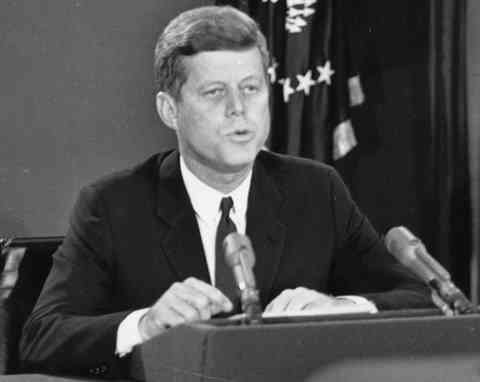A nation that isn't strong at home cannot project strength in the world
By Patrick Whelan and Kathleen Kennedy Townsend
8:00 AM EDT, October 28, 2012
On the 50th anniversary of President John F. Kennedy's dramatic announcement about the presence of Soviet missiles in Cuba, the two presidential candidates met for a debate last Monday only 250 miles away in Boca Raton, Fla. Moderator Bob Schieffer began the night by reminding the nearly 60 million viewers that those 13 days in late 1962 were "perhaps the closest we've ever come to nuclear war. And it is a sobering reminder that every president faces at some point an unexpected threat to our national security from abroad."

Though billed as a clash of ideas over foreign policy, the debate saw the candidates returning again and again to domestic issues like the deficit, "which is a significant national security concern," said President Barack Obama, "because we've got to make sure that our economy is strong at home so that we can project military power overseas." Eight times the two men agreed that the country was in need of "nation building here at home," and yet the starkest differences between them continued to be over the fundamentally different direction the two candidates would take the country on health care and the economy.
Indeed, Mr. Romney seized on health care as the principal item that would fuel his efforts to cut the deficit. "Number one I get rid of is Obamacare," he said. "There are a number of things that sound good but, frankly, we just can't afford them. And that one doesn't sound good, and it's not affordable, so I get rid of that one from day one, to the extent humanly possible." He went on to call for breaking up Medicaid and turning it into a block grant program administered by states.
But there is something perverse about Mr. Romney, of all people, seeking to cut off health insurance for millions of people in order to fund his tax policies and a significant expansion of the U.S. Navy. In Massachusetts, the Romney health reform plan helped drive down the adult un-insurance rate to less than 2 percent, enabling hundreds of thousands of people to obtain regular medical care rather than having to wait until they were sick enough to require an emergency room visit.
Money that was previously funneled to hospitals for uncompensated emergency care was redirected to provide free health insurance for residents earning less than 150 percent of the federal poverty level, resulting in much more efficient care at little additional cost to the taxpayers.
But is health care truly a national security concern? How many people's lives have to be at risk before a problem becomes a matter of national security?
With the full implementation of universal health care laws in Mexico (2011) and Turkey (2012), the United States became the last industrialized country (among all members of the Organization for Economic Cooperation and Development) without universal health insurance coverage. Despite spending 50 percent more per capita than the second highest-spending country (Norway), roughly 1 in 6 Americans had no health insurance prior to the enactment of the Affordable Care Act.
This has significant consequences. A 2004 report by the well-respected Institutes of Medicine estimated that about 18,300 deaths occur annually as a result of a lack of health insurance. A 2009 Harvard study published in the American Journal of Public Health estimated the number at nearly 45,000.
The economic competitiveness of the United States, which undergirds our military strength, is critically dependent on solving the challenge of rising health care costs, as President Bill Clinton discovered when the new movement toward health care capitation (the HMO revolution) was a major factor in the remarkable economic expansion of the 1990s.
On matters of foreign policy in their final debate -- whether in Syria, Iran, Iraq, Afghanistan or Libya -- Mr. Romney hewed closely to the positions that President Obama had charted in dealing with one challenge after another. But when it came to the one issue that most directly affects loss of American life, the provision of health care for people when they're sick, Mr. Romney went to great pains to declare that he intended to withhold from Americans the kind of personal health security he once fought for in his own state.
One of the most striking things about the Cuban Missile Crisis is recalling the true fear that children and adults across America felt in October 1962 when confronted with the possibility that they could suffer and die as a result of decisions being made in Washington, D.C. In this election, it's worth asking whether the "every man for himself" attitude that has led to the 50 percent of all personal bankruptcies caused by a family health emergency, or the thousands of deaths that result from a lack of health insurance, or the loss of competitiveness in world markets created by U.S. health care costs, brings us the kind of security our country really needs.
Dr. Patrick Whelan (jpatrickwhelan@gmail.com) is on the pediatrics faculty at Harvard Medical School and is the author (with Doug Kmiec and Ed Gaffney) of "America Undecided: Catholic, Independent and Social Justice Perspectives on Election 2012." Kathleen Kennedy Townsend is the niece of President John F. Kennedy and the former lieutenant governor of Maryland.




